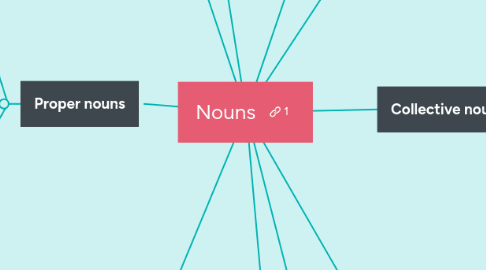
1. Possessive nouns
1.1. Possessive nouns are nouns which possess something, normally another noun
1.2. Examples
1.2.1. The cat's toy
1.2.2. Brandon's book
1.2.3. The boss's house
2. Concrete nouns
2.1. A concrete noun is a noun which can be identified through one of the five senses (taste, touch, sight, hearing, smell).
2.2. Examples
2.2.1. Phone
2.2.2. Noise
2.2.3. Rainbow
3. Proper nouns
3.1. Proper nouns are the names of specific people or places. They should always begin with a capital.
3.2. Examples
3.2.1. Mary
3.2.2. California
3.2.3. Amsterdam
4. Generic nouns
4.1. Generic nouns are nouns which are part of a generic statement.
4.2. Generic nouns can be singular or plural.
4.3. The opposite of generic nouns is collective nouns
4.4. They’re different from definite nouns (e.g. the book) and indefinite nouns (e.g. a book) in that the sentence they’re must be a blanket statement or question.
4.5. Examples
4.5.1. Cats are animals.
4.5.2. Civilization has always included cats.
5. Countable/Uncountable nouns
5.1. Countable
5.1.1. Countable nouns are nouns which can be counted, even if the number might be extraordinarily high
5.1.2. Examples
5.1.2.1. Cat/Cats
5.1.2.2. Boy/Boys
5.2. Uncountable
5.2.1. Uncountable nouns are nouns which come in a state or quantity which is impossible to count; liquids are uncountable, as are things which act like liquids
5.2.2. Examples
5.2.2.1. Intelligence
5.2.2.2. Homework
6. Irregular nouns
6.1. Irregular nouns are nouns which don’t follow a spelling pattern when pluralized.
6.2. Examples
6.2.1. Child - children
6.2.2. Mouse - mice
7. Abstract nouns
7.1. A noun which cannot be identified using one of the five senses (taste, touch, sight, hearing, smelling)
7.2. Examples
7.2.1. Courage
7.2.2. Stupidity
7.2.3. Education
8. Collective nouns
8.1. A noun which is refers to a group of nouns
8.2. Examples
8.2.1. Bouquet
8.2.2. Bunch
8.2.3. Pile
9. Common nouns
9.1. Common nouns are words for people, places or things that aren’t specific (as opposed to a proper noun which refers to only one person, place or thing).
9.2. Common nouns can be countable or uncountable, singular or plural.
9.3. Examples
9.3.1. Paper
9.3.2. Phone
9.3.3. Field
10. Compound nouns
10.1. Compound nouns are words where two nouns have been stuck together to make a new noun. Compound nouns should be written as one word, without a hyphen.
10.2. Examples
10.2.1. Toothpaste
10.2.2. Candlesticks
